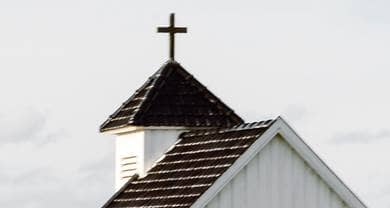- Trending:
- Forgiveness
- |
- Resurrection
- |
- Joy
- |
- Afterlife

RELIGION LIBRARY
Methodist
Leadership
Like most mainline Protestant churches, Methodists have ministers rather than priests. Priests, by definition, are an intermediary between people and the divine. So, for example, in some religions people are required to offer sacrifices to God or the gods, but they are not themselves able to do so and thus must obtain the services of a priest to sacrifice for them. Martin Luther (1483-1546) believed in the priesthood of all believers. In other words, salvation is a gift given directly by God to people, and requires no intermediary. Everyone stands directly before God at judgment, and it would do no good to bring your priest with you. That is why Protestants have traditionally discouraged emergency baptism in cases of infants born sickly. For Roman Catholics, baptism by a priest is required for salvation. For Protestants, baptism is important, but if God wills a certain infant to be saved, the presence or absence of a ceremony performed by a human cannot stand in the way.
That said, most Protestants do ordain ministers. All stand equally before God, and the gifts brought by each member of the body of Christ are equally important, but some have the gifts of leadership and preaching, and so those are trained and authorized to fulfill those roles. To avoid anarchy and promote order, most Protestants allow only ordained ministers to administer the sacraments. Methodists, once they separated from the Anglican Church (first in America, then in England, then around the world) have followed this same Protestant pattern.
Worship leaders in United Methodism are called Elders, and are ordained to administer the sacraments. There is also an ordained office of Deacon. The word "deacon" probably comes from a Greek word for "servant." At one time deacons in the Methodist Church were those preparing to be ordained as elders. Presently deacons assist elders in administration of the sacraments, but do not themselves administer the sacraments. They have authority to teach and to preach, and they can officiate at weddings and funerals. Deacons often have special responsibility to minister to the sick, poor, and oppressed.
Given the history of reliance on non-ordained preachers, circuit riders, and class leaders, Methodists have often allowed a larger role in church leadership for lay people than some other denominations. So, for example, while an ordained elder is required to complete a regular Master's of Divinity degree (which follows a college bachelor's degree) to be ordained, there is also an office practically unique to Methodism, the licensed local pastor. This office does not require a Master's of Divinity or a bachelor's degree. The licensed local pastor is not ordained, and not eligible to serve any Methodist church except in a specific conference to which he or she has been appointed by the bishop. In that one church the licensed local pastor is authorized to preach, teach, and perform the sacraments.
Study Questions:
1. What is the difference between priests and ministers? Why did Methodism choose the latter for its leadership?
2. How is official leadership within the Methodist Church organized?
3. Is education essential to Methodism's leadership? Explain.










